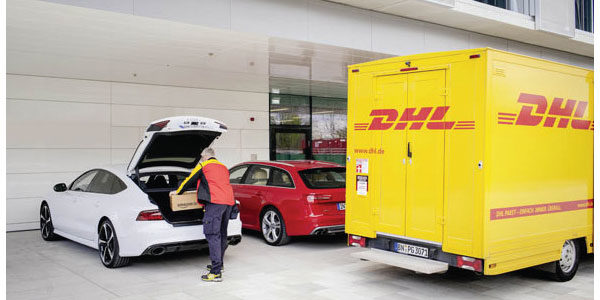DHL tests car-trunk delivery for mobile parcel program

People who are waiting for an important package to arrive may no longer have to sit home listening for the doorbell. DHL Parcel has joined forces with online retailer Amazon and car manufacturer Audi to test a program for delivering packages directly to customers' car trunks ... wherever those cars may be parked.
In May, the three companies began testing a service that allows Audi car owners in Germany to use their vehicles as mobile delivery addresses for parcels. Scheduled to run for several months in the greater Munich area, the car-drop delivery project relies on high security standards to protect both the merchandise and the automobiles.
The process begins when a registered user places an order on the German e-commerce website Amazon.de, triggering a DHL delivery agent to use a specially developed smartphone app to locate the customer's Audi and open its trunk electronically. After placing the parcel in the car, the agent shuts the trunk and uses the app to lock the car, confirm delivery to DHL, and notify the customer.
If the pilot is successful, DHL hopes to roll car-drop delivery out to a wider audience, joining the company's other creative shipping and delivery options for mobile customers, such as Packstation (24-hour, self-service, package-collection booths scattered through a city), parcel boxes (secure residential mailboxes large enough to hold boxes), and preferred location solutions (concealed places where a homeowner can retrieve boxes left on his or her own property).
Related Articles
Copyright ©2024. All Rights ReservedDesign, CMS, Hosting & Web Development :: ePublishing